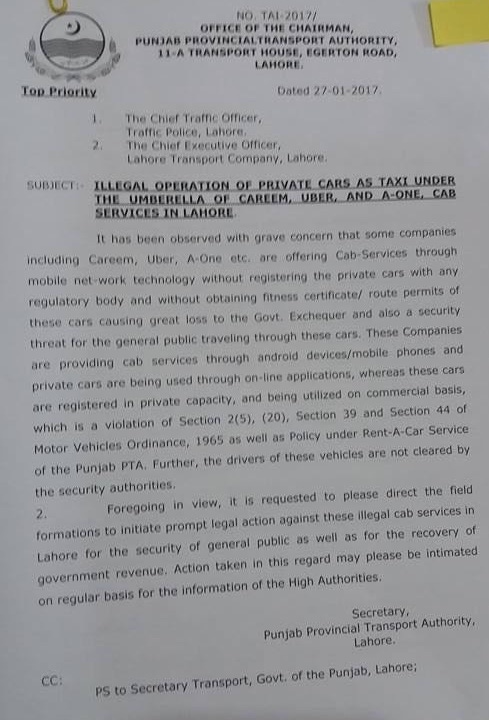Punjab Provincial Transport Authority on Monday has issued a notice to Uber and Careem over operating outside regulatory bounds in Lahore.
Punjab Transport Authority in a notification to the Chief Traffic Officer of Lahore and to the Chief Executive Officer of the
Lahore Transport Company stated that the two companies had been offering transport services “without registering the private cars with any regulatory body.
The notification also stated that the utilisation of private cars by Uber and Careem for commercial purposes is a violation of the city’s local laws.
The provincial government also stated that the failure of Uber and Careem to obtain required fitness certificates and route permits for their fleets had resulted in “great loss to the government.”
Sindh Transport Secretary Taha Farooqi also said he had written to the Deputy Inspector General Traffic Asif Aijaz asking for a ban on Uber and Careem from operating in the province.
Farooqi said the provincial government had also asked the Pakistan Telecommunication Authority to block both services’ mobile apps as they had failed to obtain required no-objection certificates (NOC) and fitness certificates.
Farooqi claimed that though negotiations were held with Uber over the last few months, only 8-10 cars had agreed to follow the authority’s rules and obtain NOCs out of a total of 1,000-1,500 cars.
Talks were also held with Careem, but there was no willingness to comply with the rules, Farooqi added.
In a message broadcast live by Careem’s Managing Director, Junaid Iqbal, after the ban was announced, the company indicated that it is open to working with the authorities on laws and regulations to document what it says is a “new economy”.
“We want to see what kind of laws we can help devise to regulate the sharing economy,” Iqbal said. “We are ready to work with the government on all levels for this.”
“We want to work with the Government of Pakistan and create 100,000 jobs by the end of 2018,” Iqbal said. “For that you need private cars, taxis, rickshaws and motorcycles who can use our platform. [Together] we can create jobs and encourage entrepreneurship,” he added.
Iqbal noted that countries around the world were devising new regulations to encourage the sharing economy, and that doing so had created jobs and encouraged entrepreneurship.
“The world over, economies are moving away from physical marketplaces to digital marketplaces,” he said.
“Different countries are devising laws to accommodate these global changes, and we request Punjab’s Chief Minister (CM) Shahbaz Sharif, Sindh CM Murad Ali Shah and Khyber-Pakhtunkhwa CM Pervaiz Khattak that this new technology, this new age, and this new economy should be embraced.
“It is in the interest of Pakistan to do so,” he added.







